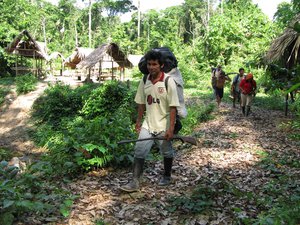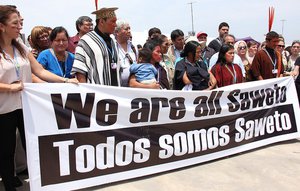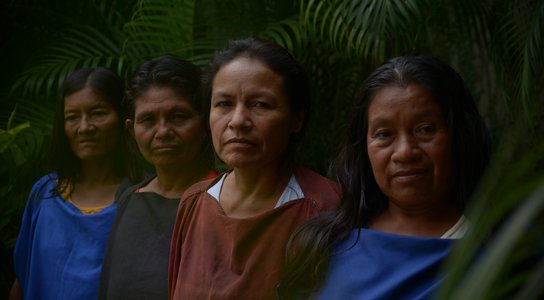What does justice look like when someone you love is brutally murdered?
For the families of four Ashéninka Indigenous leaders killed in Peru, justice looks like 28 years in prison for the five perpetrators – an unprecedented sentence. But for most land and environmental defenders murdered around the world – at least 1,733 over the last decade – there is no justice at all.

Peruvian anti-logging activist Edwin Chota. Scott Wallace/Getty Images
Edwin Chota Varela, Leoncio Quintísima Meléndez, Jorge Ríos Pérez and Francisco Pinedo Ramírez had spent years documenting and denouncing illegal logging in the Amazon’s Ucayali region. They had filed complaints with the regional and national governments showing how timber mafias were encroaching on their ancestral lands.
Their community, the Alto Tamaya Saweto, had unsuccessfully been fighting to get full recognition of their rights over such lands. In early September 2014, all four defenders left their homes and headed for Brazil to meet fellow Indigenous leaders. They never made it across the border.
Indigenous communities across the Peruvian Amazon are besieged by logging, mining and land grabbing operations. Yet, they are at the frontline of the fight against climate change and ecological collapse. Study after study has shown that deforestation rates are up to 50% lower in their territories. In defending their forests, they are protecting us all. But too often, nobody is protecting them.
At Global Witness, we have been calling for the effective protection of land and environmental defenders in Peru, where we have recorded at least 51 killings of defenders between 2012 and 2021. Half of them were Indigenous peoples. In 2016, we went undercover to expose some of the major timber exporters involved in the country’s biggest timber scandal – a shipment from the Amazon to the US, more than 96% of which was found to be illegal.

Comunidad de Saweto/Alberto Ñiquen Guerra
As the prosecutor’s investigation into the killings of the Ashéninka leaders confirmed, the murderers were illegal loggers. This hardly comes as a surprise. What is surprising, and a reason for hope, is that the murders have not gone unpunished – a rare occurrence.
It’s taken more than eight years, relentless advocacy and calls for justice from the community, and at least five public prosecutors working on the case, but the Supreme Court of Justice in Ucayali has finally spoken. Just yesterday the judge read the full sentence and a final judgement is expected soon. The historic sentence of 28 years in prison sets a powerful precedent to ensure impunity is no longer the norm. Only when those who are responsible for attacks against defenders are held accountable will we start seeing impunity decline and justice prevailing.
In 2016, following the tragic killings of the four defenders, their community, the Alto Tamaya Saweto, gained full recognition of rights over their lands. Almost 77,000 hectares are now legally theirs. While this does not automatically remove the threats they continue to face, it does bring them a step closer to ensuring that both the community and their forests thrive. What does justice look like? A bit like this.

